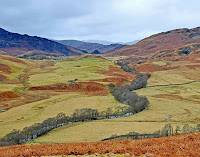Even though the sea-in-seashell symbol could be a good literary opening, it appears in the middle of Wordsworth's poem when, in his memory, he sees himself as a boy:
"A curious child, who dwelt upon a tract
Of inland ground, applying to his ear
The convolutions of a smooth-lipped shell;
To which, in silence hushed, his very soul
Listened intensely; and his countenance soon
Brightened with joy; for from within were heard
Murmurings, whereby the monitor [the shell] expressed
Mysterious union with its native sea."
In the very next line, Wordsworth opens up the metaphor of how -- if we orient ourselves properly -- we can "hear" in the natural world intimations ("Murmurings") of a larger, deeper reality: "Even such a shell the universe itself / Is to the ear of Faith...." Moreover, Wordsworth later addresses his words to a larger divine Spirit that includes all of our own spirits, just "as the sea her waves."The magic of children innocently believing (at least for a moment) they are hearing the sea in a shell derives from a child's wonderful delight in first discovering the world. And so, a stanza early in the poem began with the statement "Such was the Boy."
 |
| oil portrait of William Wordsworth by Benjamin Haydon |
"If the dear faculty of sight should fail,
Still, it may be allowed me to remember
What visionary powers of eye and soul
In youth were mine; when, stationed on the top
Of some huge hill -- expectant, I beheld
The sun rise up, from distant climes returned....
... my spirit was entranced
With joy exalted to beatitude...."
~~~
Are there some particular experiences in Nature that allows your spirit to feel how it is included as part of some larger Spirit of life and of the universe?
(The two large excerpts are from Book IV, "Despondency Corrected" of The Excursion [1814]
That full section of the book-like poem can be read at this external link: The Excursion, Book IV.)


